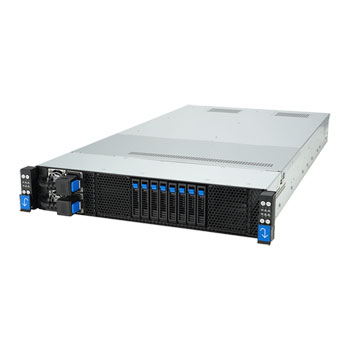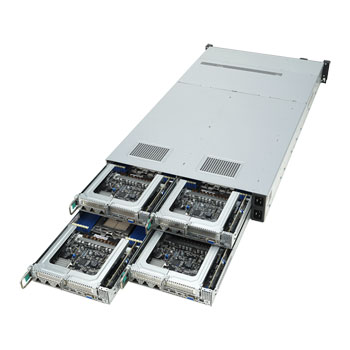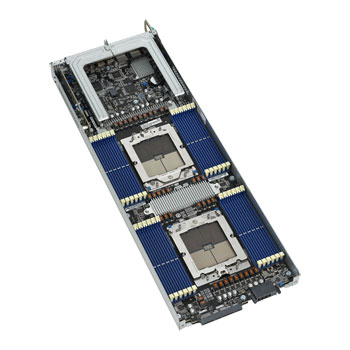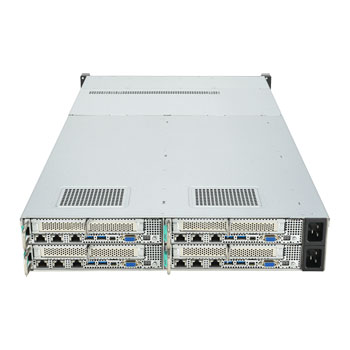ASUS RS720QA-E12-RS8U/10G/2600W(1+1)
ASUS RS720QA-E12-RS8U/10G/2600W(1+1)
Scan Code:LN146445
Manufacturer Code:90SF02R1-M000L0
Customer Reviews and Q&A
Faster Storage, Graphics and Networking Capabilities
PCI Express® (PCIe®) 5.0 delivers 32GT/s bandwidth, which is twice the speed of PCIe 4.0, and offers lower power consumption, better land scalability and backwards compatibility. ASUS servers are PCIe 5.0 ready with scalability design to satisfy the increasing workloads for modern data center.
Massive Compute Performance
Transform your data center TCO with the high-density server powered by AMD EPYC™ 9004 Series Processors. With an innovative design that fits four nodes in a 2U chassis, RS720QA-E12-RS8U accommodates dual-socket CPUs, PCIe 5.0 to satisfy the increasing demands for efficiency, density and TCO-optimisation for data centers, web servers, virtualization, cloud and hyperscale environments.
A Comprehensive Liquid Cooling Solution
This server is a purpose-built for intensive workloads for HPC data centers, with optimised space design to fit direct-to-chip solution, delivering lower PUE and Operating Expenditures to balance power consumption and green energy awareness. By working with partners, ASUS were able to deliver a total solution — from servers to liquid-cooling modules, and even data-center floor plans and suggested infrastructure.
Direct-to-Chip Cooling Solution
ASUS direct-to-chip cooling is a quick, simple option that’s based on existing infrastructure. D2C can be deployed quickly, and lower PUE (power-usage effectiveness). ASUS servers can support manifolds and cool plates to enable diverse cooling solutions. Moreover, ASUS servers can support a rear-door heat exchanger that complies with standard rack-server designs, so there’s no need to replace all racks — just the rear door. This lowers the total cost of ownership, and increases data-center utilisation ratio.
AMD EPYC™ 9004 Series Processors
The 9004 Series EPYC CPUs amplifies the AMD history of x86 architecture innovations and record-breaking performance with next generation 5nm technology as well as introducing support for high performant DDR5 DIMMs and fast PCIe® Gen 5 I/O. EPYC 9004 CPUs support 12 memory channels with 2 DIMMs/channel capability, delivering the resources needed for memory hungry AI, ML, HPC, and large in-memory computations.
Computing Performance
ASUS servers feature Performance Boost technology to achieve the best server performance and agility by tuning servers to match the requirements of workloads, letting you gain greater control of your server environment. This technology improves workload throughput by maximizing processor frequency and boost power, ideal for timesensitive applications such as financial services or data center operations.
Core Optimizer
Maximizes the processor frequency in multi-core operations, avoiding frequency shifting for reduced latency.
Engine Boost
Automatic power acceleration with an innovative voltage design to increase server overall performance.
Workload Presets
Preconfigured BIOS server profiles based on workloads and benchmarks for improved performance and efficiency.
Server-Management Solution
Remote Server Management
ASUS ASMB11-iKVM is the latest server-management solution from ASUS, built upon the ASPEED 2600 chipset running on the latest AMI MegaRAC SP-X. The module provides various interfaces to enable out-of-band server management through WebGUI, Intelligent Platform Management Interface (IPMI) and Redfish® API.
IT Infrastructure Management Software
ASUS Control Center (ACC) is remote IT management software designed for monitoring your hardware and software IT assets and inventory status and enabling seamless remote BIOS configurations and updates, efficient IT diagnostics and troubleshooting and enhanced security with Hotfix updates, allowing easier server management for any IT infrastructure.
Enhanced Security
Hardware Root-of-Trust Solution
ASUS servers integrate PFR FPGA as the platform Root-of-Trust solution for firmware resiliency to prevent from hackers from gaining access to infrastructure. ASUS security solutions are fully compliant with the 2018 National Institute of Standards and Technology (NIST) SP 800 193 specification.
Trusted Platform Module 2.0
ASUS servers also include support Trusted Platform Module 2.0 (TPM 2.0) to secure hardware through integrated cryptographic keys and offer regular firmware update for vulnerabilities.







